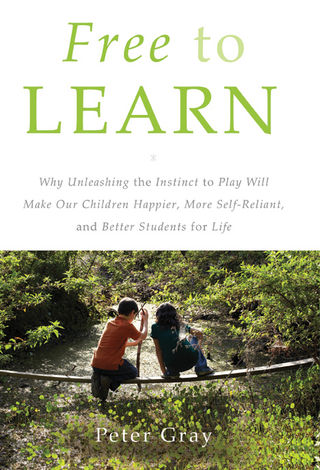Education
What If Medicine’s First Principle Were Also Education’s?
What if state-sponsored schools had to prove they do more good than harm?
Posted September 10, 2016

Primum non nocere, First, do no harm. As part of becoming a doctor, students at most medical colleges must take an oath, derived partly from the ancient Hippocratic oath, in which they declare their understanding that the first principle of medical practice is “do no harm.” Of course, many medical treatments do, necessarily, entail some harm; so what this principle means in practice is that any potential harm to a patient must be balanced against the projected benefit for that patient, and there must be good evidence that the benefit will outweigh the harm.
What if our compulsory schooling system had to provide evidence, for every child, that the benefit of its schooling outweighs the harm? Here’s little Suzy, 5 years old. The state says she has to start kindergarten; neither she nor her parents have any say in the matter (unless the parents are in a position to homeschool or afford some other means of meeting the state’s compulsory education requirement). What if the state were required, before they enrolled little Suzy, to prove that the institution they are forcing her into will, in all probability, benefit her more than it hurts her?
If the state had to do this—if they had to live up to a “do no harm” pledge—schooling as we know it would collapse. We would have a sudden, long-overdue educational revolution. In fact, even if the requirement were the less demanding one of proving that the schooling we provide benefits the average child, or most children, more than it hurts them, the system would collapse.
Compulsory schooling is an enormous intrusion into the lives of children and families, and its harm is well documented.
I’ve sometimes heard from defenders of forced schooling what I refer to as the “bad-tasting medicine” justification. Schooling, they say, may not be pleasant, but it is necessary for the person’s long-term well-being. Never mind that most medicines take a couple of seconds to swallow while compulsory schooling takes 11 years (or 13 in some states). Never mind that there is no evidence at all that forced schooling does more good for children than can be accomplished with a much more pleasant tasting and less expensive placebo. The placebo I have in mind is unschooling, or democratic/free schooling, where children remain in charge of their own lives and learning, with help when they want it, not coercion, from caring adults.
If schooling were a drug, it would never make it past the FDA. There is no evidence that it creates more benefits than the placebos I mentioned, and there is a lot of evidence that it inflicts serious damage. Here is just some of that documented evidence:
• A large-scale study involving hundreds of students from many school districts, using an experience sampling method, revealed that students were less happy in school than in any other setting in which they regularly found themselves.[1]
• Verbal abuse from teachers is a common occurrence. In one survey, for example, 64 percent of middle school students reported experiencing stress symptoms because of verbal abuse from teachers[2]. Another study revealed that nearly 30 percent of boys were verbally abused by teachers in kindergarten, and the abuse increased in years after that.[3] Surveys of adults indicate that between 50 percent and 60 percent of them recall school-related experiences that, in their view, were psychologically traumatic.[4]
• In a study in which 150 college students were asked to described the two most negative experiences in their lives—experiences that negatively affected their development—by far the most common reports (28 percent of the total) were of traumatic interactions with school teachers.[5] In a study in which adults were interviewed to find out about positive, peak learning experiences occurring in their schooling, few could recall such experiences, but many recalled negative experiences, which interfered with rather than supported their development.[6]
• Hair cortisol levels in young children were found to be significantly higher in samples taken two months after starting elementary school than in samples taken two months prior to starting elementary school.[7] Hair cortisol level is reflective of chronic stress, the sort of stress that can seriously impair physical growth and health.
• A large-scale national survey conducted by the American Psychological Association (reported here) revealed that U.S. teenagers feel more stressed-out than do adults and that school is by far the main cause of their stress (noted by 83 percent of the sample). In the same study, 27 percent of teens reported experiencing “extreme stress” during the school year, compared to 13 percent reporting that during the summer.
• The rate of emergency mental health visits leading to at least one overnight stay (the sort of visits that derive from serious breakdowns or attempted suicide) at a children’s medical center was found to be more than twice as high during school months as compared to summer vacation months (here).
To this add the sheer amount of children’s and teenagers’ time that is wasted by the school system. If you don’t believe it ask the principal of your local school for permission to “shadow” a student for a day—that is, spend the whole school day doing just what the student is required to do. All the adults I know who have done that—including a number of teachers—were shocked at the tedium, the time wasted, during which they were not free to occupy themselves with anything of their own choosing. None of them wanted to do it for a second day. Believe me, children and teens have no more tolerance for tedium than do adults; they just have no choice in the matter.
Noninvasive education as the alternative to forced schooling
Whenever possible, enlightened, conscientious physicians look for noninvasive or minimally-invasive methods to correct medical problems instead of highly invasive methods, such as surgery or toxins, which interfere with the body’s integrity and can cause pain, disablement, or even death. Forced schooling is an extraordinarily invasive educational practice. The noninvasive alternative is self-directed education, as in unschooling or democratic free/schooling. Research conducted to date suggests that these modes of education are at least as effective as forced schooling in preparing young people for adult life and far less disruptive of children’s and family’s day-to-day existence.[8]
But the educational establishment doesn’t want to know about that evidence. Those who profit from forced, intrusive education are like surgeons who profit from surgery and don’t want to know that there are cheaper, less invasive ways of solving the particular medical problem they have been treating. I have on two occasions applied, with colleagues, to major educational research foundations for a grant that would allow for a well-designed, systematic study of both the short-term and long-term effects of standard schooling (both public and private) compared with self-directed education. In both cases the proposal was turned down with no explanation at all and no encouragement to apply again. I hate to sound immodest, but I’ve been in the research business a long time and have reviewed quite a few grant proposals. I know that our proposed study, in both cases, was far more sound in design and addressed questions that are far more crucial to children’s well-being and the future of our nation than is true for most (if not all) of the research studies funded by those foundations. The evidence to me is overwhelming that the educational establishment simply does not want anyone to ask the big question: Is our current compulsory, top-down system of education actually more effective in producing competent, productive, well-employed, happy adults than is noninvasive, self-directed education?
Imagine what would happen if one of the foundations actually funded such a well-designed study and the results came out showing, in a way that was hard to dispute, that the noninvasive procedure works as well as or better than the invasive one. How could they then justify the educational behemoth that supports so many careers and enriches so many companies? There would no longer be a need for university departments of education. The need for teachers would be greatly reduced—down to a small number who would be sought out by self-directed learners because of their skills and knowledge, not because of “teaching credentials.” There would be little need for textbooks; and, without forced consumers of such books, the prices on them would have to drop and their quality would have to increase.
The revolution in education will come, but it will not come from within the educational establishment. It will come because more and more people are using whatever legal means they can to remove their kids from the invasive system. As this happens, over time, an ever greater number of people will know people who have grown up outside of forced schooling and will see that noninvasive education works. At some point, the floodgates will open, and the educational establishment will become irrelevant, eventually extinct. I hope that point comes while I’m still alive. Please help make it happen.
---------
And now, what do you think about this? … This blog is, in part, a forum for discussion. Your questions, thoughts, stories, and opinions are treated respectfully by me and other readers, regardless of the degree to which we agree or disagree. Psychology Today no longer accepts comments on this site, but you can comment by going to my Facebook profile, where you will see a link to this post. If you don't see this post at the top of my timeline, just put the title of the post into the search option (click on the three-dot icon at the top of the timeline and then on the search icon that appears in the menu) and it will come up. By following me on Facebook you can comment on all of my posts and see others' comments. The discussion is often very interesting.
See also Free to Learn, alternativestoschool.com; self-directed.org (to find out about ASDE), and join me on Facebook.

References
[1] Csíkszentmihályi, M., & Hunter, J. (2003). Happiness in everyday life: The uses of experience sampling. Journal of Happiness Studies, 4, 185–199.
[2] Irwin A. Hyman & Donna C. Perone (1998). The Other Side of Student Violence: Educator Policies and Practices That May Contribute to Student Misbehavior. Journal of School Psychology, 36, 7-27.
[3}Brengden, M., Wanner, B., & Vitaro, F. (2006). Verbal abuse by the teacher and child adjustment from kindergarten through grade 6. Pediatrics, 117, 1585-1598.
[4] A. G. McEachern, O. Aluede & M. C. Kenny (2008). Emotional abuse in the classroom: Implications and interventions for counselors. Journal of Counseling and Development 86, 3-10.
[5] J. M. Branan (1972). Negative human interactions. Journal of Counseling Psychology, 19, 81-82.
[6] K. Olson. Wounded by School. Teachers’ College Press, 2009.
[7] Children’s hair cortisol as a biomarker of stress at school entry Groeneveld et al (2013). Stress: The International Journal on the Biology of Stress, 16, 711-715.
[8] For a review of the evidence and references to the studies see: P. Gray (2016). Mother nature’s pedagogy: How children educate themselves, pp 49-62 in H.E. Lees & N. Noddings (Eds.), The Palgrave international handbook of alternative education.
---------




